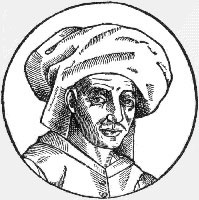Josquin Desprez
(c.1455-1521)
In an era when music was generally performed a few times before being replaced by something newer, Josquin des Prez was a rarity: a composer who was remembered and honored long after his death. Throughout the sixteenth century, his works were cited in theoretical treatises and extensively quoted in the music of other composers. In 1538, seventeen years after Josquin died, Martin Luther extolled him as “the master of the notes, which must do as he wishes, while other composers must follow what the notes dictate.” Even in the seventeenth and eighteenth centuries, Josquin’s music was not entirely forgotten, while the nineteenth century saw him acclaimed (alongside Palestrina) as one of the two greatest composers of the Renaissance.
 Conjectures about Josquin’s Early Years Conjectures about Josquin’s Early Years
Employment records, archives, and references to contemporary events in his tell us what little we know about Josquin Desprez. And unfortunately, it is hard to be certain about many facts. Josquin, like most musicians of his time, traveled extensively, leaving today’s scholars to discover the paths he took. Adding to this challenge is the fact that loose and alternative spellings were used for names during this period, and Josquin Desprez’s name appears in many forms. Moreover, along with the confusion created by the different spellings, it seems that “Josquin” was a fairly common name at the time; thus scholars must also distinguish amongst the various “Josquins” to determine which was Desprez.
For instance, until recently scholars had confused Josquin Desprez with a singer also named Josquin, and that mistake led to the dating of Josquin Desprez’s birth to around 1440. Recent scholarship, however, has distinguished between the two individuals. In all likelihood, Josquin was born sometime in the mid-1450s. This timing is inferred from a document attesting to his employment in 1477, at which time Josquin was likely in his early twenties.
There is also no certainty concerning Josquin’s birthplace, but several sources point to somewhere in the vicinity of the town of Saint-Quentin in Picardie, a region north of Paris. Supporting this hypothesis is an historical account of the parish of Saint-Quentin, written in 1633, which indicates that Josquin had been a choirboy at that parish and was later in charge of the music. It is also noteworthy that the area surrounding the modern day border between Belgium and France produced a remarkable number of great Renaissance composers, who were designated the Franco-Flemish school because of their common geographical origins.
Aside from his possible presence at Saint-Quentin parish, nothing is known of Josquin’s education and musical training. The fact that several of his early works quote music from the older composer Johannus Ockeghem has led scholars to believe that Josquin may have known him. Moreover, the name of Josquin appears in a famous poem, Nymphes des Bois, by the poet Jean Molinet, written to lament the death of Ockeghem, which Josquin later set to music. Yet there is no definitive evidence either way.
Court Service
The oldest extant document mentioning Josquin is a record dated April 19, 1477 that attests to his employment as a singer in the service of René, Duke of Anjou. At that time, René’s court was established in Aix-en-Provence. Other sources allow us to make the conjecture that Josquin worked in Aix-en-Provence as early as 1475 and until at least 1478, and possibly 1480, the date of the Duke of Anjou’s death. It is also known that, in 1483, Josquin inherited some property from his uncle in Condé-sur-L’Escaut, the town were he retired.
Little is known about Josquin’s activities between 1478 and 1483. Apparently, when René d’Anjou died, the members of his chapel were transferred to the service of Louis XI, King of France, who was René’s nephew. If Josquin was still among them, he may then have spent a few years in Paris. Another hypothesis is that Josquin left for Italy at the time of his patron’s death in 1480. Yet another theory, but one which little evidence supports, is that Josquin might have belonged for a time to the court of Matthias Corvinus, King of Hungary.
By 1484, however, there is more definite evidence as to his whereabouts. A document dated June 19, 1484 describes Josquin as a chaplain in the service of Cardinal Ascanio Sforza, a member of the ruling family of the Duchy of Milan. This document and other Vatican archives report that Josquin hoped for, obtained, and eventually resigned, a benefice in the French parish of Saint-Aubin. They also establish that Josquin worked for the Sforza family until at least 1489. Two other composers working in Milan, Franchinus Gaffurius and Serafino dall’Aquila, refer to Josquin in their works, thus confirming his presence in the city.
In 1489, Josquin entered the papal chapel of Innocent VIII. When the latter died in 1492, Alexander VI succeeded him. Josquin’s name remains listed on the employment records of the chapel until 1495. The date at which he left the chapel is, however, impossible to establish precisely, since five years of records after 1495 are now lost. However two early sixteenth-century frottolas are attributed to him and they infer that, by then, Josquin had returned to the Sforza household.
In fact, Josquin may actually never have resigned from his service in Milan: he may simply have been allowed to serve in Rome through an arrangement between Cardinal Ascanio and the Papal Chapel. It seems that working for the Papal Chapel offered certain advantages, in particular the possibility of claiming more benefices, and Ascanio’s permitting this exchange may have been a way for him to reward his best musicians. This theory is supported by the knowledge that at least one other composer working for the Sforza family, Gaspar van Weerbeke, composed in Rome under a similar arrangement before likewise returning to Milan, about ten years before Josquin possibly did the same.
Whatever the case, it is likely that Josquin had returned to Milan sometime before 1499. At this time, Louis XII, King of France, who, according to an older treaty, had claims on the duchy, occupied the city. Louis XII had several members of the Sforza family imprisoned, including Ascanio, and thus he himself served as the official Duke of Milan until 1513. It is believed that Josquin served the King of France during his occupation of Milan. Although there is no archival evidence supporting this conjecture, several of Josquin’s compositions seem to have been written in order to meet the demands of the French court. An example is the piece Vive le roy (Long Live the King). Moreover, the sixteenth-century music theorist Heinrich Glarean also reported that Josquin wrote his motet Memor esto verbi tui servo tuo (Remember your Word to your Servant) in order to remind Louis XII that he had promised Josquin a benefice.
In April 1503 Josquin moved back to Ferrara, Italy, where he went to work for the duke, Ercole d’Este. Ercole was an ally of Louis XII, whose daughter he later married. Contacts between the two courts likely favored Josquin’s return to Italy. Two letters related to the recruitment process survive. They were sent to the duke by two advisors in charge of looking for the new maestro di cappella. One recommends Josquin, clearly implying that he was the very best person for the job, whereas the other favors the composer Isaac Heinrich.
The second letter does not deny that “Josquin composes better,” but, interestingly, it mentions, “He composes when he wants to and not when one wants him to, and he is asking 200 ducats in salary while Isaac will come for 120.” Indeed, 200 ducats was a very generous salary for the position. Stressing that Isaac was “more good-natured and companionable” and would “compose new works more often,” this second letter is the only source that provides any information about Josquin’s personality. Apparently, he was an early, somewhat anachronistic example of a temperamental and freethinking artist.
Only a few months after Josquin’s arrival, Ferrara was struck by the plague. Ercole d’Este took refuge in an estate located away from the city. Maybe because of the plague, Josquin left his service after only a year. The threat was indeed significant: Josquin’s replacement, the composer Jacob Obrecht, contracted the plague and died only one year after his arrival.
Provost of Condé
After leaving Ferrara, Josquin returned to northern France where he had grown up. He had owned property in Condé-sur-l’Escaut since 1483, and was able to secure the position of provost at Condé’s collegiate church. A document attests to his acceptance to the church’s chapter on May 3, 1504. From this date until his death in 1521, Josquin remained in Condé, thus making it the place where he stayed the longest. There is not much documented evidence of his activity during these last seventeen years. Documents dated from 1508 and 1509 show that the cathedral in Bourges was interested in his services as a chorus master. The Condé church, however, itself had an excellent ensemble, which Josquin is unlikely to have left.
The cause of Josquin’s death, on August 27, 1521 remains unknown; but his end seems to have been expected, since, a few days earlier Josquin established his will in the presence of the mayor of Condé and other witnesses. The law of the time stated that a lord could claim rights over the property of the inhabitants of his fief when they died, unless they paid a tax, which Josquin did on this occasion. He was then able to request that his possessions be given to the church’s chapter.
After Josquin’s death, the chapter paid him homage through a regular commemorative service, endowed by the sale of his house. On this house was attached an image of the Virgin Mary, and it remained customary during processions to pause by the house, face the image, and sing Josquin’s settings of the Ave Maria and Pater Noster.
The church of Condé was destroyed in 1793, during the anticlerical turmoil that followed the French Revolution. Thus, Josquin’s tomb no longer exists. However, the inscription on the tombstone was copied into a seventeenth-century manuscript, the English translation of which reads as follows:
Here lies Josse despres
Provost of these grounds he once was:
Pray to God for those who have passed away
Him who gives them his paradise.
Passed away in the year 1521, the 27th of August:
You have always been my hope
References:
Macey, Patrick and Jeremy Noble: ‘Josquin (Lebloitte dit) des Prez’, Grove Music Online ed. L. Macy (Accessed 1 March 2006),
<http://www.grovemusic.com>
Miller, Clement A.: ‘Glarean, Heinrich’‚ Grove Music Online ed. L. Macy (Accessed 20 March 2006), <http://www.grovemusic.com>
Sherr, Richard, ed. The Josquin Companion. Oxford: Oxford University Press, 2000.
Strohm, Reinhard. The Rise of European Music, 1380-1500. Cambridge: Cambridge University Press, 1993.
Trouvelot, Marie-Hélène, ed. Histoire de France. Paris: Larousse, 2005. |




